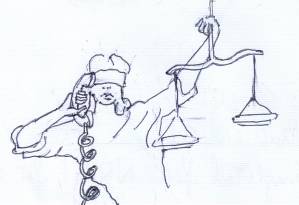Attempts underway to reinstate repressive Jan 16 laws

Less than a month after dangerously repressive laws were revoked by Ukraine’s parliament, efforts are increasing to reinstate a number of the most worrying norms.
The latest attempt comes with formidable patrons, including the president, Viktor Yanukovych, in a bill proposing amendments to various legislative acts purportedly aimed at ‘strengthening specific guarantees for judges’ independence’. Changes to the judicial system were initiated in 2010, soon after Yanukovych came to power, and despite the titles, have consistently heightened pressure on judges and eroded their already fragile independence.
The draft bill, No. 4135, was tabled by two pro-presidential Party of the Regions MPs, Valery Pysarenko and Volodymyr Pylypenko. The pretext was an instruction from the president to tighten security for judges following the murder of Kremenchuk judge Oleksandr Lobodenko. If this truly was the prompt, then the lightening speed of the response is incredible. Lobodenko was murdered on Feb 11. The draft law, together with a supporting letter from the head of the Supreme Court, was tabled just three days later, on Feb 14.
It cannot be said that serious creativity was required, since most of the norms have simply been lifted from the notorious Jan 16 Law No. 721-VII. Most have little or nothing to do with ensuring judges’ personal safety, although one innovation is the considerable enlargement of the list of people deemed to need state protection. This would now include people working in the court as well as judges, and their families, with a long list of eligible relatives.
If the law is passed, the penalties for contempt of court would be stepped up, with the present fine more than doubled, and the possibility of jail for 15 days added. A worrying aspect here is that the decision as to what constitutes disrespect or contempt of court would be made by the judges without any protocol being drawn up and without the right of appeal.
One of the many aspects of the Jan 16 law which aroused particular concern is back again in the form of additions to Article 376 of the Criminal Code on ‘interference in the work of the courts" This is interpreted as “unlawful gathering, storing, use, destruction or circulation of confidential information about a judge; his/her close relatives or members of the family; circulation of material or information of an overtly offensive nature and which demonstrates brazen disrespect for the judge or the justice system; pressure; intimidation or interference in any other form in the work of a judge for the purpose of revenge, obstructing the judge from carrying out his or her official duties or in order to achieve a wrongful ruling; or public calls or circulation of material with calls to such activities”. The penalties range from a very large fine to up to 2 years imprisonment. A note is added stating that this does not apply to such gathering etc of information in accordance with the Public Information Act and laws on the mass media.
The disclaimer is unlikely to convince anybody since the courts over the last two years that the much trumpeted Public Information Act has been in force have proved very obliging in giving extremely broad interpretations of what can be regarded as confidential information’ to be concealed from the public. There have been enough cases to preclude any confidence that you would not end up facing criminal charges for posting information about the career strides of judges, like Rodion Kireyev who passed sentence n the politically motivated prosecution of Yulia Tymoshenko or about the sumptuous lifestyle of other high-profile judges. While information directly and solely concerning the finances of a judge may still fall under the Public Information Act, the scope has now been extended for shutting up all but the most intrepid since members of their family would also be protected from such “interfering information” by the law.
Court curators working together with police bodies will have extended power to ‘maintain the peace’ and stop “demonstrations of disrespect for the court”. This will include the use of special methods, the list of which will be determined by the Cabinet of Ministers (meaning that there is no public or parliamentary discussion).
Two trends have been seen over the last three years. Judges have found themselves under increasing pressure to provide the rulings demanded by the prosecutor, or sometimes politicians. Just last week, on Feb 11 the High Council of Justice dismissed Iryna Mamontova, the only judge who had ordered house arrest rather then detention of peaceful protesters. On the other hand, those judges who can be relied on to issue “the right rulings” can be assured of full protection and other benefits.
These are not the only changes first pushed through on Jan 16 and never seriously discarded. Police powers have been increased through Cabinet of Ministers Decrees; Party of the Regions MP Vadym Kolisnychenko lost no time tin registering another bill aimed at making all NGOs receiving money from outside Ukraine register as “foreign agents”. Now this bill proposes to reinstate other repressive measures in order to safeguard judges’ “independence”. It’s called ensuring respect for Ukraine’s courts.
Halya Coynash





